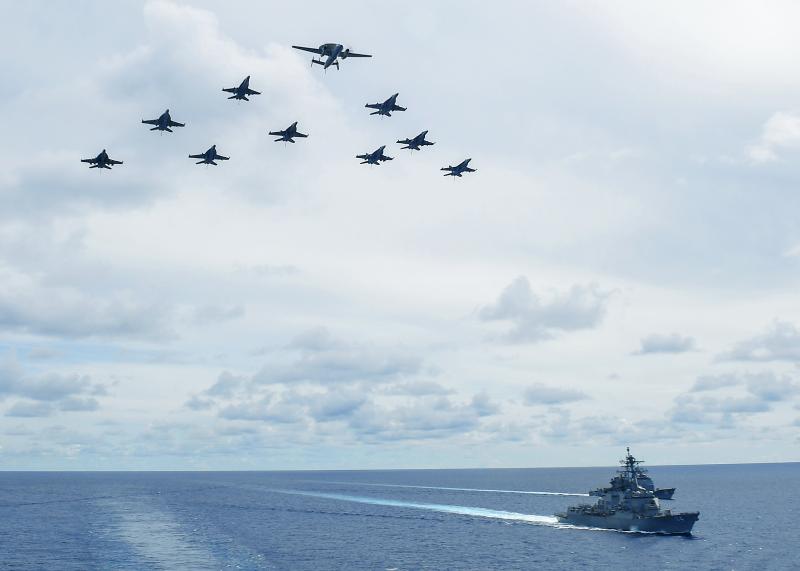A US Navy destroyer yesterday sailed through the Taiwan Strait to show Washington’s “commitment to a free and open Indo-Pacific,” the Seventh Fleet of the US Indo-Pacific Command said in a statement.
The Arleigh Burke-class guided missile destroyer USS Ralph Johnson was conducting a routine transit through international waters, the fleet said.
“The ship’s transit through the Taiwan Strait demonstrates the United States’ commitment to a free and open Indo-Pacific,” Seventh Fleet spokesperson Nicholas Lingo said in a statement. “The United States military flies, sails and operates anywhere international law allows.”

Photo: EPA-EFE
The Chinese Ministry of National Defense did not immediately respond to a faxed request for comment.
Taiwan’s Ministry of National Defense confirmed the transit, saying in a statement that the military had a full grasp of the situation as the US warship sailed through the Strait northward, and did not spot any irregularities.
According to the US military, the last time the US Navy conducted a similar navigation was on Jan. 22, when the USS Dewey (DDG-105), an Arleigh Burke-class guided missile destroyer, sailed through the Strait.
US Navy ships routinely sail through the Taiwan Strait, but yesterday’s transit came as the crisis in Ukraine continues to unfold.
Taiwan is in a heightened state of alert due to Russia’s invasion of Ukraine, nervous that China might try to take advantage of the situation to make a move on the nation, although the government has reported no unusual Chinese maneuvers.
The air force last night said that eight Chinese military aircraft had entered the nation’s southwestern air defense identification zone earlier in the day.
Taiwan responded by dispatching planes to monitor the Chinese aircraft, issuing radio warnings and mobilizing air defense assets, it added.
China has sent record numbers of military aircraft into Taiwan’s air defense identification zone over the past two years.
Beijing says Taiwan is the most sensitive and important issue in its relations with Washington.
A growing number of US allies have transited the Strait as Beijing intensifies its military threats toward Taiwan and solidifies its control over the disputed South China Sea.
British, Canadian, French and Australian warships have all passed through the Strait in the past few years, sparking protests from Beijing.
Collin Koh, a research fellow at Singapore’s S Rajaratnam School of International Studies, keeps a database of declared US transits through the Strait.
Nine were conducted in 2019, followed by 15 in 2020 and 12 last year. So far this year there have been two, including the USS Ralph Johnson crossing.
Additional reporting by Wu Su-wei and AFP

ENDEAVOR MANTA: The ship is programmed to automatically return to its designated home port and would self-destruct if seized by another party The Endeavor Manta, Taiwan’s first military-specification uncrewed surface vehicle (USV) tailor-made to operate in the Taiwan Strait in a bid to bolster the nation’s asymmetric combat capabilities made its first appearance at Kaohsiung’s Singda Harbor yesterday. Taking inspiration from Ukraine’s navy, which is using USVs to force Russia’s Black Sea fleet to take shelter within its own ports, CSBC Taiwan (台灣國際造船) established a research and development unit on USVs last year, CSBC chairman Huang Cheng-hung (黃正弘) said. With the exception of the satellite guidance system and the outboard motors — which were purchased from foreign companies that were not affiliated with Chinese-funded

PERMIT REVOKED: The influencer at a news conference said the National Immigration Agency was infringing on human rights and persecuting Chinese spouses Chinese influencer “Yaya in Taiwan” (亞亞在台灣) yesterday evening voluntarily left Taiwan, despite saying yesterday morning that she had “no intention” of leaving after her residence permit was revoked over her comments on Taiwan being “unified” with China by military force. The Ministry of the Interior yesterday had said that it could forcibly deport the influencer at midnight, but was considering taking a more flexible approach and beginning procedures this morning. The influencer, whose given name is Liu Zhenya (劉振亞), departed on a 8:45pm flight from Taipei International Airport (Songshan airport) to Fuzhou, China. Liu held a news conference at the airport at 7pm,

GRIDLOCK: The National Fire Agency’s Special Search and Rescue team is on standby to travel to the countries to help out with the rescue effort A powerful earthquake rocked Myanmar and neighboring Thailand yesterday, killing at least three people in Bangkok and burying dozens when a high-rise building under construction collapsed. Footage shared on social media from Myanmar’s second-largest city showed widespread destruction, raising fears that many were trapped under the rubble or killed. The magnitude 7.7 earthquake, with an epicenter near Mandalay in Myanmar, struck at midday and was followed by a strong magnitude 6.4 aftershock. The extent of death, injury and destruction — especially in Myanmar, which is embroiled in a civil war and where information is tightly controlled at the best of times —

Taiwan was ranked the fourth-safest country in the world with a score of 82.9, trailing only Andorra, the United Arab Emirates and Qatar in Numbeo’s Safety Index by Country report. Taiwan’s score improved by 0.1 points compared with last year’s mid-year report, which had Taiwan fourth with a score of 82.8. However, both scores were lower than in last year’s first review, when Taiwan scored 83.3, and are a long way from when Taiwan was named the second-safest country in the world in 2021, scoring 84.8. Taiwan ranked higher than Singapore in ninth with a score of 77.4 and Japan in 10th with